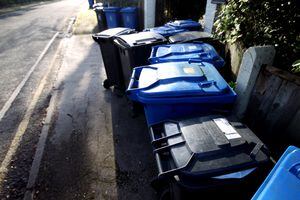Recycling rates drop during lockdown as Greenpeace tells ministers to fix the system
Recycling rates took a hit in the the Shropshire Council area during the early months of the Covid-19 pandemic, figures reveal, as bin collectors picked up more than 40,000 tonnes of waste.

Environmental campaigners Greenpeace say the UK is still throwing away too much as a country and have called on ministers to “show some bottle” and fix the waste system.
Department for Environment, Food and Rural Affairs figures show Shropshire Council collected 46,832 tonnes of waste between April and June last year – roughly on a par with the same period in 2019.
In Telford & Wrekin 24,263 tonnes was collected – down 188 tonnes – one per cent – from the amount recorded during the same period in 2019.
Of the rubbish collected in Shropshire over the period, 59 per cent was sent for recycling – down from 61 per cent a year before.
For Telford & Wrekin the rate increased – 55 per cent was sent for recycling – up from 53 per cent a year before.
The figures count household and non-household waste, including recyclable and non-recyclable objects.
But Defra cautioned that some local authorities’ collections were heavily disrupted by the first coronavirus lockdown, which could affect the data.
Decrease
Across England, councils collected 6.2 million tonnes of waste in the three months to June last year – down about 576,000 tonnes, or nine per cent, from a year earlier.
Of that, 43 per cent was sent for recycling – a decrease from 46 per cent in 2019.
"Covid has clearly impacted waste collection across the board, but it hasn't changed the fact that we're still producing too much rubbish and recycling too little of it,” said Greenpeace UK's political campaigner Sam Chetan-Welsh.
“If we want to fix our waste system, we need to cut the amount of waste we produce in the first place and invest in better recycling infrastructure to capture what's left.”
A recent report by Greenpeace revealed that more than half the plastic waste the Government counts as recycled ends up overseas in places like Turkey, where the group found evidence of it being dumped and burned illegally.
Mr Chetan-Welsh said the Government needs to stop exporting plastic waste and introduce an all-inclusive deposit return scheme for drinks containers.
He also called for legally binding targets to slash single-use plastics in half by 2025, adding: “It's time for ministers to show some bottle."
Disruption
The Local Government Association said councils have worked tirelessly throughout the pandemic to keep household waste and recycling centres open and collection services running as best as possible.
“Any level of disruption would inevitably have an impact on recycling rates across the country,” said David Renard, the LGA’s environment spokesman, who added that rates were expected to increase again as restrictions eased.
He also called on the Government to push manufacturers to produce less plastic packaging that cannot be recycled.
A Defra spokeswoman said less than 10 per cent of household waste is now going to landfill, while the amount of food waste being recycled has increased by over 40 per cent since 2015.
She added: “But there is still a lot more to do, and that’s why we have brought forward major reforms for packaging and kerbside collections which will boost recycling, step up our war on plastic pollution and reduce litter.”





